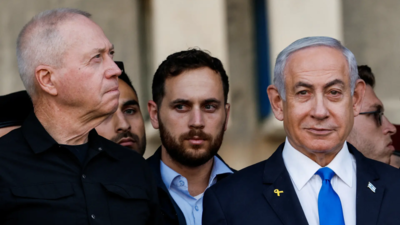
Israeli Prime Minister Benjamin Netanyahu’s shock dismissal of his defense chief on Tuesday night removed a cabinet critic, but also deepened anger among the opposition over his handling of the country’s multi-front conflict. in Job Gallant, Netanyahu There was a defense minister who challenged many of his plans for a war against Hamas in Gaza and threatened the stability of his fragile coalition. Netanyahu said there was a breakdown in trust between him and Gallant.
Gallant, who spoke regularly with Pentagon chief Lloyd Austin and helped weather tensions between Israel and the U.S. between Netanyahu and Biden, gave three reasons for the dismissal. One of them, he said, had to do with the conduct of the war in Gaza. Gallant Long said the best way to release the hostages would be to accept a phased ceasefire, even if it meant withdrawing from parts of Gaza.
Another reason was the growing division over the recent Supreme Court ruling overturning the exemption of Orthodox Jews from military conscription. Gallant said the decision had to be implemented, while Netanyahu and his Orthodox political allies wanted to bypass it.
In recent days, Netanyahu has failed to implement a policy that would have allowed Orthodox men, known as Haredim, to avoid economic sanctions if they refused to serve. Haredi parties, the main members of the coalition, have threatened to topple the government if they do not do so.
A third point of contention between Gallant and Netanyahu was over the former’s call for a commission of inquiry to “expose the truth and learn lessons” about Oct. 7, 2023, when Hamas attacked Israel from Gaza, triggering the war. It was the worst day in Israel’s history in terms of the number of Israelis killed. Netanyahu says the state investigation will be a distraction as the conflict continues.
While Gallant’s departure could stabilize Netanyahu’s coalition, it weakens him in other ways. Opponents – including a business forum that includes the CEOs of some of Israel’s biggest companies – cried foul and said he was prioritizing the nation’s security and his political survival over hostages. Protesters took to the streets in Tel Aviv and Jerusalem, although they failed to persuade Netanyahu to change his mind. “Chaos,” read a headline in Israel’s largest newspaper Yediot Aharonot on Wednesday. “This is how democracy dies,” wrote the newspaper’s chief columnist, Nahum Barney.
On Wednesday, Israeli strikes killed at least 38 people around the eastern city of Baalbek in the Bekaa Valley in Lebanon, according to the regional governor, and in the evening more strikes hit southern suburbs of Beirut. The attack came shortly after Hezbollah Secretary General Naim Qasim said he did not believe “political action” would end hostilities.
Lebanon renewed its call for a ceasefire and submitted a new complaint to the UN Security Council about Israel’s attacks on the country. Lebanese Prime Minister Najib Mikati said the escalating Israeli offensive against Lebanon amounted to a “crime” against humanity.